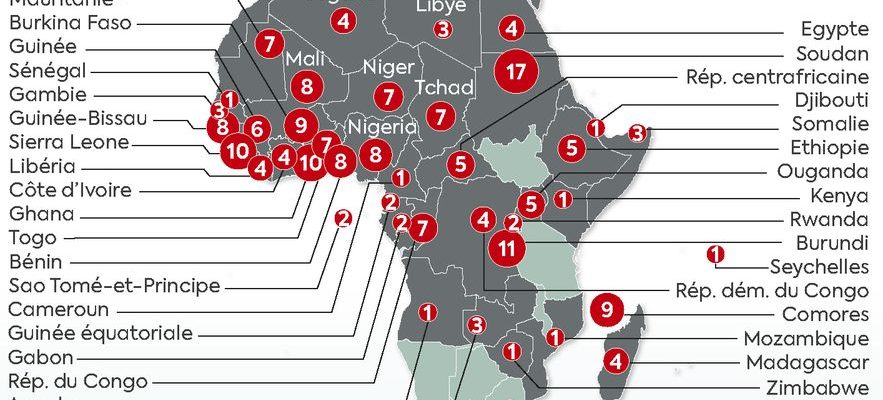Both the putschists and the international community are feverishly awaiting the decision of ECOWAS. This Saturday, August 12, the Economic Community of West African States announced the postponement of an important meeting scheduled for the same day in Ghana, supposed to endorse or not a military intervention in Niger, in reaction to the recent coup State in this country of the Sahel. On July 26, the presidential guard, supported by the Nigerien army, forcibly deposed elected president Mohamed Bazoum, justifying this act by “the deterioration of the security situation” in the country in the face of multiple jihadist attacks.
Faced with this third coup in one of its member countries since 2020, ECOWAS threatened at the end of July to use force to “restore constitutional order”, before officially activating a “standby force” last Thursday. Although the contours of such an operation are still unclear, this military solution echoes previous operations carried out by the organization since 1990. Historical overview.
The end of the civil wars in Liberia and Sierra Leone
The military role of ECOWAS begins fifteen years after its foundation. In 1990, the organization announced the creation of a temporary military force: the Ceasefire Monitoring Brigade (abbreviated Ecomog, according to its English name). This interposition force, which will bring together up to 20,000 soldiers, was formed in response to the civil war in Liberia: the supporters of President Samuel Doe then opposed the rebels led by Charles Taylor. After long discussions, Ecomog entered Liberian soil in August 1990 and managed to bring peace in 1997. ECOWAS soldiers remained until 1999 to ensure security.
It is in the face of a similar situation that the regional organization organizes its second intervention. In May 1997, Ecomog then deployed to Sierra Leone, a neighboring nation of Liberia, also in civil war since 1991. There again, two revolutionary groups opposed President Ahmad Tejan Kabbah, before taking power from 1997. The contingent of 11,000 ECOWAS soldiers ended up ousting the military junta in 1998 before restoring the previous presidency. They will also oppose a new rebel offensive on the capital a year later.
Multiple coups in Guinea-Bissau
In the meantime, ECOWAS has assumed its diplomatic role: in 1993, the organization adopted a new status claiming to be responsible for the prevention and settlement of regional conflicts. It was therefore on this basis that it also chose to intervene in Guinea-Bissau in February 1999. After clashes between the army and the Movement of Democratic Forces in the Casamance region (MFDC), a former head of Bissau-Guinean general staff provoked a coup d’etat, which gradually turned into a civil war. Ecomog then confronts the rebel forces, without preventing a resumption of fighting and the overthrow of the president.
Despite everything, ECOWAS redeployed another force in the country, Ecomib, twice. In 2012, she ousted a military regime following a new coup against the Prime Minister and favorite in the presidential election, Carlos Gomes Junior. More recently, in June 2022, a stabilization force of 600 men was deployed with a one-year renewable mandate in order to avoid yet another seizure of power by force.
3762-ITW_NIGER
© / art press
A curb on separatist threats in Côte d’Ivoire, Mali and Gambia
Military interventions therefore attempt more generally to avoid definitive divisions within West African countries. In 2003, 1,300 ECOWAS soldiers traveled to Côte d’Ivoire to enforce a peace agreement between loyalist soldiers and rebels of the Forces Nouvelles, which had taken control of the center and north of the country a year earlier. The country will remain divided for eight years, until the victory of the former rebel forces in 2011.
ECOWAS also intervened in January 2013 in the face of the fragmentation of another African state: Mali. For the first time, the organization is sending its intervention force against jihadist groups linked to Al-Qaeda in order to regain control of the north of the country. This is an international support mission in Mali (Misma), in agreement with the UN and bringing together up to 6,300 men.
Finally, ECOWAS has also assumed a preventive role in The Gambia. In January 2017, outgoing President Yahya Jammeh refused to leave power, despite the victory of his opponent Adama Barrow in the presidential election. ECOWAS forces entered Gambian territory shortly after the outbreak of tensions, before the operation was suspended a few hours later to successfully negotiate the abdication of the former president.
A force that is giving way to the benefit of the UN
While ECOWAS interventions have been successful overall since the first operation in Liberia, West African forces failed a decade later: in 2003, a new mission of around 3,500 men was deployed in Monrovia, after three months of siege by a rebellion. This time, Ecomil does not manage to expand in the country and transfers its contingent to the UN.
This is a general trend: after the initial military intervention, the ECOWAS armed forces, which must remain to maintain the peace in the country of intervention, are generally eventually integrated into United Nations missions. This was also the case in 2000 in Sierra Leone, in 2004 in Côte d’Ivoire, then in 2013 when the West African mission in Mali was absorbed by the UN Minusma.
Failure or not, ECOWAS military operations are primarily aimed at maintaining peace in the short or medium term, instead paving the way for international security operations to ease the remaining tensions after its intervention. A strategy that does not always prove effective: in June 2023, the United Nations Mission for the Stabilization of Mali (Minusma) finally decides to withdraw before achieving its objectives, under pressure from the putschists in power since 2020.
